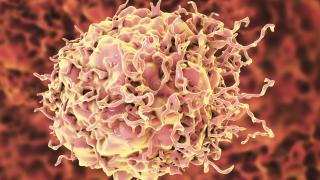An international Phase 3 clinical trial found that metastatic colorectal cancer patients with a rare genetic tumor mutation called KRAS G12C experienced superior progression-free survival rates compared to standard of care when offered a combination treatment of KRAS inhibitor sotorasib and monoclonal antibody panitumumab. City of Hope was a participating site and a City of Hope researcher is the lead author of the The New England Journal of Medicine study published this week.
Standard chemotherapies often fail to control or eliminate the disease for patients with the KRAS G12C mutation, which is associated with worse outcomes. So, it is important to identify novel therapeutic options following disease progression on first- and second-line chemotherapy such as fluoropyrimidine, oxaliplatin and irinotecan.

“This is the first Phase 3 clinical trial to show a benefit over standard of care in patients with the KRAS G12C mutation whose cancer progressed after receiving standard chemotherapy. The efficacy results from our study are promising in this population with unmet needs and should set a new standard of care for metastatic colorectal cancer patients with the KRAS G12C mutation who progressed following prior standard treatments,” said Marwan Fakih, M.D., professor in the Department of Medical Oncology & Therapeutics Research and the Judy & Bernard Briskin Distinguished Director of Clinical Research at City of Hope. Fakih is lead author of the new study and principal investigator of the clinical trial at City of Hope.
Building on positive results from a Phase 2 trial that evaluated sotorasib, a KRAS G12C inhibitor, in combination with panitumumab, an antibody targeting epidermal growth factor receptors on normal and tumor cells, the Phase 3 trial evaluated the same duo of medications and tested sotorasib at two different doses. Participants in the randomized trial, all of whom had progressed on standard chemotherapy, were given either 240 milligrams of sotorasib with panitumumab, 960 milligrams of sotorasib with panitumumab, or standard of care therapy with anti-cancer medications (either a combination of trifluridine-tipiracil or regorafenib).
Encouraging Results
Both the lower and higher doses of sotorasib in combination with panitumumab achieved superior progression-free survival rates over the other anti-cancer medications. The higher dose regimen was particularly effective, more than doubling the median time to progression compared to standard of care, Fakih reported. Additionally, the higher dose regimen resulted in a far larger number of patients with major disease regression, “with response rate of 26.4% versus zero,” he added.
“While this study sets a new standard following progression on standard chemotherapy, additional studies will interrogate the value of this regimen when combined with standard chemotherapy in earlier treatment settings in patients with metastatic KRAS G12C mutated colorectal cancer,” Fakih said. “In addition, ongoing biomarker work will help better define the mechanisms of resistance to this targeted combination and how to overcome such challenges.”
Funded by Amgen, the clinical trial is ongoing but no longer recruiting participants.
Pictured above: Illustration of a colorectal cancer cell.
